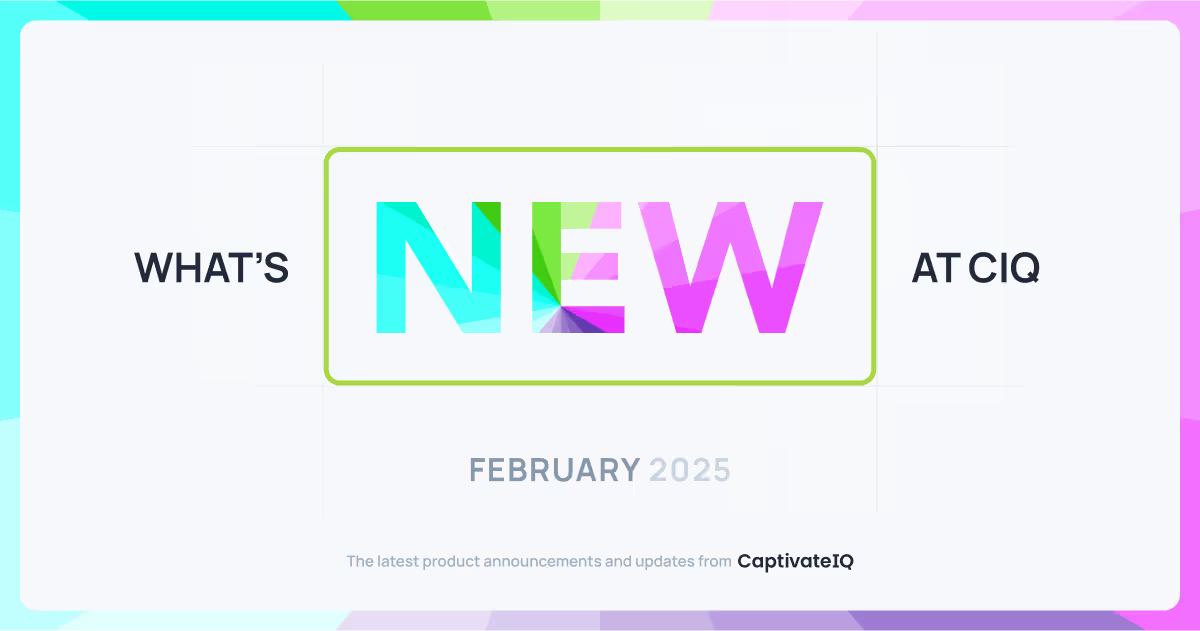Stop Compromising on Commissions - CaptivateIQ Now Pairs Ultimate Flexibility with Enterprise Scalability
CaptivateIQ is Reimagining Its Plan Builder Experience with Reusable Global Attributes and Calculation Components
Commission management is growing increasingly more complex. In our recently published State of Incentive Compensation report,almost half (49%) of the incentive compensation professionals we surveyed rated the inability to scale their program as a top challenge. And on top of that, 81% of respondents reported that at least 10 individuals are involved with managing commissions – and one-third of those we surveyed manage variable compensation for over 1,000 reps – which highlights the breadth and complexities of these programs.
It’s no surprise these teams are demanding both unique logic that incentivizes the right behaviors, and a level of power to accomplish this at scale. Yet compensation professionals have historically been forced to compromise, choosing between a) spreadsheets for flexibility at the expense of painful plan upkeep, or b) rule-based ICM solutions that scale, but limit how you can incentivize your teams.
Thankfully, those days are over.
Ushering in a New Era of Commission Management
CaptivateIQ has long offered a flexible, no-code modeling experience powered by our SmartGrid ELT and calculation engine. Now, we’re pairing that flexibility with scalability with reusable Calculation Components and Global Attributes to deliver a unique experience that doesn’t force compensation professionals to choose one mediocre way or the other.
An Introduction to Scalable Plan Builds
Our latest launches – Calculation Components and Global Attributes – bring a new level of efficiency and precision to commission plan management.
Global Attributes
With the sheer amount of data compensation professionals often oversee, it’s no wonder hours each week are spent just on upkeep alone. That’s why we’ve built Global Attributes – a centralized source of truth for attribute data (such as role, team, and quotas) with effective dating and inheritance – to ensure this manual upkeep can be completed quickly and efficiently, with minimal risk of human error.
Global Attributes is a centralized table in CaptivateIQ that serves as a single source of truth for employee, plan and commission related data. Rather than keeping these data points uniquely across plans, Global Attributes allows you to build a table of employee attributes (such as role and team) and plan data (quotas and ramps) for use across all plans, and manage any changes from that single hub.
It used to be that compensation teams would spend hours combing through plans across a massive spreadsheet to make a single update (ex a promotion or a quota change) in each location that data lives. Now, a comp admin can update everything in a centralized location, pushing these changes automatically across all relevant plans and maintaining accuracy and relevance. We can even automate payee assignment to plans based on the attributes, fully removing those manual touchpoints.

Calculation Components
While companies often have a number of different plans across different teams, segments, and geographies, we’ve seen that for the most part, there’s common logic across these plans. Instead of spending hours rebuilding plans or repeatedly copy-pasting formulas, we’ve built reusable Calculation Components to allow comp professionals to create and manage calculations centrally for use across several plans. This resource makes it easy to update those calculations wherever they live as they change over time, all from one location.
Imagine a Flat Rate Commissions Calculation, a common component across different plans. With Calculation Components, you can now build it once and reuse it everywhere, ensuring consistency and saving time.

Our Vision: Faster Deployments with an Out-of-the-Box Components Library
In our next step towards a more scalable plan build experience, we are building a Components Library to make plan builds more templatized and drag-and-drop. This library will contain common calculation components (such as accelerators, gates, and true-ups ), so that compensation professionals looking to leverage best practice logic can start from a template and customize to suit their unique business logic, allowing them to more quickly deploy new plans with a head start.
What do global attributes and calculation components power?
With a more scalable plan build and management experience, comp teams get:
- Faster Plan Builds with Plug & Play Plan Design: Instead of starting from scratch, quickly create and deploy commission plans using centralized attributes and a pre-built library of calculation components.
- Better Accuracy & Efficiency with Centralized Commissions Management: Manage updates from a central location, ensuring all plans are accurate and up-to-date without the manual touchpoints or validation.
- More Efficient Growth with Easier Plan Optimizations: Adapt plans swiftly to keep incentives aligned to business goals – even when those goals change.
All of this – combined with the ability to tailor your commission plans to any unique logic – truly helps deliver an experience that is unrivaled in the commission management space today.
The future of commission’s management
“The commissions space is at a unique inflection point – compensation teams today are expected to incentivize growth efficiently, but with minimal resources,” said Conway Teng, co-founder and co-CEO of CaptivateIQ. “With every new feature added to our platform, we’re helping comp professionals navigate this challenging environment, combining the flexibility to incentivize exactly how they need to, with the scalability to build and manage plans efficiently, no matter the size of the company or number of employees on incentive compensation plans.”
Join Us: Curious to learn more about the future of commission plan management? Attend our upcoming Demo Spotlight Webinar or speak with our team today to learn more.
Already using CaptivateIQ? Take our training to learn about how you can take advantage of these new & upcoming functionality.
.svg)








